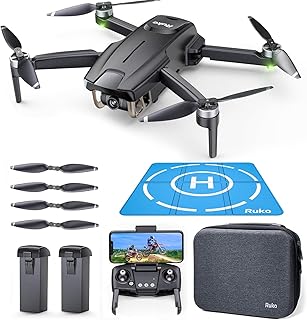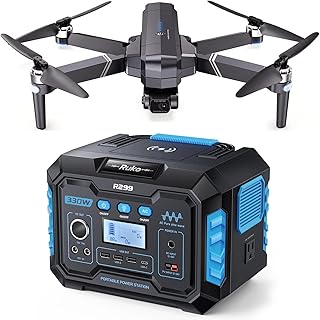Ruko Drone: A Beginner's Guide to Flying
Congratulations on your new Ruko drone! This guide will help you get started and learn the basics of flying.
Before You Fly:
* Read the Manual: The user manual for your specific Ruko drone model is your best friend. It contains detailed instructions on assembly, charging, safety precautions, and how to operate the drone.
* Charge the Battery: Fully charge both the drone and the remote control battery before your first flight.
* Choose a Safe Flight Area: Find a spacious area free of obstacles, power lines, and people. An open field, park, or empty parking lot is ideal for beginners.
* Check the Weather: Avoid flying in windy conditions or during rain or snow.
Taking Flight:
1. Calibration: Follow the manual's instructions to calibrate your drone. This involves aligning the compass and sensors for accurate flight performance.
2. Power Up: Turn on the drone and the remote control. Ensure both devices are connected and the drone's lights indicate readiness.
3. Takeoff: Gently lift the drone from the ground to initiate takeoff. You can use the throttle stick on the remote control to control its ascent.
4. Control Basics:
* Throttle Stick: Controls the drone's altitude (up and down).
* Pitch Stick (Left): Tilts the drone forward and backward.
* Roll Stick (Right): Tilts the drone left and right.
* Yaw Stick: Rotates the drone left and right.
5. Practice Hovering: Once airborne, gently use the throttle stick to maintain a steady height. This is crucial for mastering control.
6. Directional Movement: Experiment with the pitch and roll sticks to move the drone forward, backward, left, and right.
7. Landing: Gently lower the drone towards the ground using the throttle stick. When it's close, stop the drone's descent and let it gently settle.
Important Tips:
* Start Small: Begin with short flights and gradually increase your flying time as you gain confidence.
* Stay Aware of Your Surroundings: Keep an eye on the drone's position, altitude, and any potential obstacles.
* Practice Regularly: Frequent practice will help you improve your piloting skills.
* Use Beginner Modes: Some Ruko drones may have beginner modes that limit speed and altitude, making it easier to learn.
* Take Breaks: Avoid flying for extended periods, as this can lead to fatigue and poor judgment.
* Respect the Law: Be aware of local regulations and restrictions regarding drone operation.
Additional Resources:
* Ruko Website: Visit the Ruko website for support documents, user manuals, and videos.
* Online Forums: Join online communities and forums dedicated to drones for advice and tips from experienced pilots.
* Flight Simulator: Consider using a drone flight simulator to practice your skills in a virtual environment.
Remember, flying drones is a fun and rewarding hobby, but it also requires responsibility and safety awareness. By following this guide and practicing regularly, you will soon be flying your Ruko drone like a pro!


